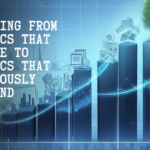Artificial intelligence (AI) has become the predominant trend in 2023, pushing the boundaries of knowledge and technological capabilities for individuals. The current landscape is teeming with unparalleled innovations that are set to revolutionize our lifestyles as we advance further into the AI development phase.
The realm of AI offers a plethora of opportunities and complex challenges that require careful planning and deep contemplation. Understanding these aspects is crucial for businesses, entrepreneurs, and the general public at this pivotal moment.
Let’s explore the potential of artificial intelligence without delay, examining the upcoming opportunities, the obstacles we may face, and the profound impact AI is poised to make on contemporary society.
Future Perspectives on Artificial Intelligence (AI)
Disruptive Innovations in Business Operations
AI is a disruptive force that is reshaping how businesses operate. According to a Deloitte survey of 2,620 global leaders, 94% of respondents view AI as crucial to their success. These cutting-edge systems empower businesses to gain valuable insights, streamline processes, and enhance customer experiences.
Monitoring AI systems strategically is essential for staying competitive and laying the foundation for future success in launching new ventures while surpassing established players.
AI assists business owners in launching online enterprises by conducting market research and data analysis efficiently. AI-powered systems swiftly gather and analyze vast amounts of data, providing valuable insights into competitive landscapes, consumer preferences, and industry trends.
Moreover, AI technology plays a vital role in streamlining various business operations. By utilizing IoT text generators, business owners can focus on strategic initiatives rather than mundane tasks like creating numerous product descriptions.
Chatbots equipped with AI capabilities can handle customer inquiries and provide immediate assistance round the clock, improving customer relationships and satisfaction, increasing sales, and fostering brand loyalty. Additionally, it reduces the workload on customer service teams.
Personalization is key in business. Brands that offer personalized experiences are more likely to engage over 80% of consumers. By leveraging AI to analyze consumer behavior and preferences, businesses can recommend relevant products and deliver personalized marketing, creating a tailored and engaging experience for customers.
This heightened level of personalization enhances consumer engagement, conversion rates, and ultimately leads to increased revenues and sustained growth.
Urban Planning and Infrastructure: The Rise of Smart Cities
The global smart city market is projected to reach $3,110 billion by 2028, with an annual compound growth rate (CAGR) of 19%, as reported by The Insight Partners. This substantial growth is fueled by the integration of big data analytics, AI, and IoT technologies into urban environments.
Intelligent urban solutions enable advanced urban design, enhanced energy efficiency, and improved public services, attracting investments from both public and private sectors to meet the demand for greener and more efficient infrastructure.
For example, Chattanooga, Tennessee, in partnership with Seoul Robotics, has implemented a lidar-infused traffic management system that provides real-time data on traffic patterns and bottlenecks, enabling quick response in case of accidents and enhancing traffic strategies.
Cities of all sizes are leveraging smart technologies to enhance their infrastructure and public services, with sensors ranging from lidar to environmental monitors working tirelessly to enhance citizens’ quality of life.
The rapid adoption of cutting-edge technologies and a concerted effort to upgrade underdeveloped infrastructure are fueling the significant growth of the smart city sector, signaling a transformative shift that is here to stay.
Leveraging the Power of Big Data and Data Analysis
The explosion of data from sources like cellphones, IoT devices, and servers has created a data deluge that surpasses human capacity for analysis. AI systems, when combined with big data, are reshaping trends across various sectors, from business to entertainment.
By harnessing this data, AI can gain deeper insights into consumer behavior through social interactions and online activities. However, the effectiveness of AI depends on the quality of the data it processes.
For instance, precise and validated data used to train AI models can accurately assess the total cost of hiring new employees worldwide. As the saying goes, “garbage in, garbage out.”
Forbes highlights an intriguing point: the integration of AI and big data could automate nearly 80% of real work and significant portions of data processing and collection, transforming companies’ strategies based on real-time insights and optimizing supply chains.
The future lies in harmonizing AI with human intuition as it becomes more sophisticated and potent. Training the next generation of experts is essential to prepare for this exciting frontier.
AI in Music, Video, and Design: Fostering Creativity
Art, design, and creativity are traditionally driven by passion, intuition, and emotion. However, the emergence of AI opens up new avenues for innovation and creativity across various domains.
Forecasting systems can predict fashion trends, AI-driven design software can enhance structural layouts for both aesthetics and reliability, and AI-powered tools can streamline graphic design processes by generating company logos, suggesting color schemes, and dynamically adjusting designs.
Paul McCartney’s revelation of using AI to create the ultimate Beatles track, featuring lyrics from the late John Lennon, exemplifies the magical possibilities AI offers in the realm of music.
In the video production industry, AI can automatically curate footage, enhance video sequences with voice-over services, color grading, stabilization, and audio synchronization, revolutionizing the efficiency and effectiveness of content creation.
The fusion of machine learning’s efficiency with human creativity’s emotional essence is propelling the boundaries of possibility in design, music, and video production.
Challenges for Artificial Intelligence (AI) in the Future
Addressing Data Privacy and Cybersecurity Concerns
The effective operation of AI requires extensive data collection, raising concerns about data security amid escalating cyber threats. The significant data breaches in 2022, each costing an average of $4.35 million, underscore the vulnerability of modern information systems.
These breaches not only have immediate economic repercussions but also erode public trust, emphasizing the urgent need for robust data protection measures. Organizations must invest significantly in advanced encryption methods, multi-factor authentication, and blockchain technology to strengthen data security as AI systems become more integrated into daily life.
System awareness is evolving to aid in breach detection and prediction, with sophisticated algorithms working tirelessly to thwart malicious AI or hacker activities, setting the stage for an AI versus AI showdown. Is this brilliance or madness?
Cybersecurity emerges as a primary threat to the widespread adoption of AI, with 53% of global leaders recognizing it as a significant concern. However, only 38% of respondents have implemented measures to safeguard their data, highlighting the pressing need to bridge this gap swiftly.
Navigating the Regulatory Landscape of AI Technology
As AI propels us into the future, government regulations are likely to evolve to govern its applications. Even tech visionary Elon Musk advocates for AI regulation, citing the potential risks posed by superintelligent AI and the need for ethical AI development.
The rapid advancements in AI design are outpacing our ability to comprehend, regulate, or anticipate the consequences of highly sophisticated digital intelligences, underscoring the need for precise regulations to ensure the ethical and safe deployment of AI technologies.
While the path to establishing comprehensive rules for responsible AI usage remains unclear, concerted efforts are necessary to navigate this evolving regulatory landscape effectively.
Societal Impact: The Future of Artificial Intelligence (AI)
Enhancing Accessibility: AI Empowering Individuals with Disabilities
AI’s impact extends beyond autonomous vehicles, offering hope for individuals with disabilities. Text-to-speech technology emerges as a transformative application of AI, transcending text-to-speech conversion to empower visually impaired individuals to access books and information seamlessly.
Imagine a world where language barriers are eliminated, enabling everyone, including those with visual impairments, to access informative content effortlessly. AI’s rapid evolution positions it as a versatile tool for entertainment, education, and communication, in addition to aiding individuals with disabilities.
AI is reshaping HR management practices to promote inclusivity in the workplace. Modern HR teams leverage AI tools for accessibility applications and real-time translations, fostering diverse work environments that enrich corporate culture and expand talent pools, a significant milestone in promoting diversity and inclusion.
The Convergence of AI and Lifelong Learning in Educational Evolution
AI offers prompt feedback, yet it must prioritize effective strategies that nurture lifelong learning. However, the risk of subpar content delivery by AI, such as providing incorrect solutions, raises concerns about the quality of education and individuals’ preparedness for the future.
To ensure AI’s growing role in education positively impacts society, immediate action is imperative. The Office of Educational Technology envisions a future of technology-enhanced learning that mirrors an electric vehicle, prioritizing student awareness, control, reduced workload, and enhanced learning outcomes, signaling a transformative shift in educational paradigms.
Striking the Balance Between Human Intelligence and Artificial Intelligence
While AI holds immense potential, human intellect and emotional intelligence possess unique value. Striking the right balance between AI and human capabilities is crucial for sustainable integration in the long run.
While automated systems excel at data processing, humans offer context, empathy, and judgment, essential for critical decision-making, especially in healthcare. Embracing AI as a tool to enhance rather than replace human abilities is key to leveraging its speed and breadth of knowledge while preserving the human touch in decision-making processes.
The promise of artificial intelligence technology lies in its ability to enhance lives, drive innovation, and tackle complex business challenges. Embracing AI research and development as we navigate a future where human-machine collaboration shapes a better world marks an exciting era of progress.






